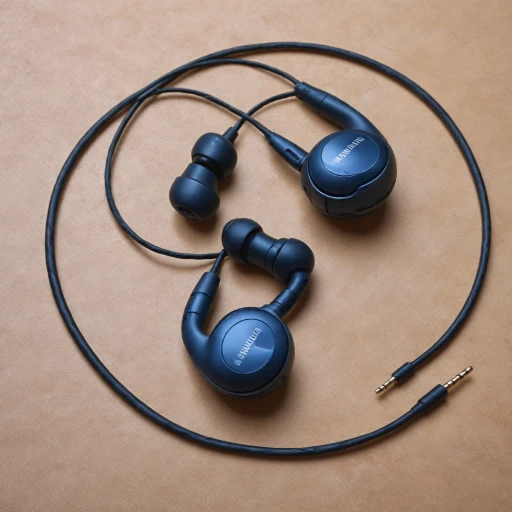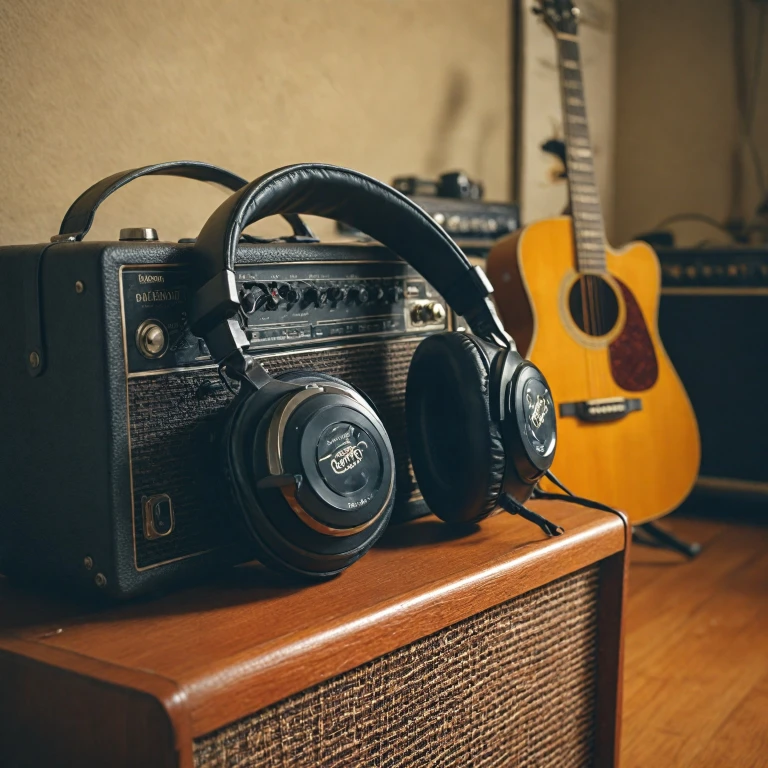Understanding noise canceling technology
Decoding the Magic Behind Noise-Canceling Technology
Noise-canceling headphones have become a staple for both casual listeners and professional musicians seeking to refine their audio experiences. For guitarists, understanding this technology is paramount in choosing the best gear for their
guitar amp. At its core, noise-canceling technology is designed to create a serene auditory environment, allowing every note and rhythm to shine.
Active noise-canceling (ANC) is the standout feature in most top-rated headphones today. This technology utilizes microphones and speakers to generate sound waves that are specifically designed to neutralize external noises. Whether you're in a bustling city or a lively studio, this can make a significant difference in audio quality, letting the true essence of your music come through without distraction.
Why does this matter, especially for musicians? When playing guitar through a headphone amp, every nuance of sound is crucial. Noise-canceling capabilities ensure that subtle frequencies and dynamic ranges aren't drowned out by background noises, allowing for an authentic studio experience whether at home or on the go.
Moreover, these headphones provide a richer bass response and clearer frequency range which are vital when assessing the quality of guitar bass tones. Options such as Audio Technica headphones or the wireless capabilities of Bluetooth headphones further enhance this feature, enabling a seamless, immersive experience in any setting.
However, choosing the right headphones often involves considering aspects like price, comfort, and how consumer reviews rate their performance over time. Whether you opt for wireless headphones or wired ones, the stars aligned for your audio experience can be found in top-rated products like the Technica ATH series or the Waza Air headphones.
Understanding noise-canceling technology is not just about blocking the unwanted; it's about embracing the pristine clarity your guitar amp deserves. With knowledge of how this technology transforms your sound, you set the stage to dive deeper into what features would best complement your musical journey.
Why noise canceling matters for guitarists
The Significance of Noise Canceling for Guitarists
Noise canceling technology goes beyond just creating a quieter environment; it profoundly impacts the way guitarists interact with their music. When you plug into a guitar amp, the quality of your ear headphones can transform your playing experience. Here's why noise canceling headphones matter:
- Enhanced Audio Clarity: By blocking out external noises, noise canceling headphones allow every frequency and note played through your guitar amp to emerge with remarkable clarity. Whether it's the deep guitar bass or the crisp treble tones, the sound quality delivered is pivotal for both practice and performance settings.
- Precision in Sound: The frequency response that headphones offer is critical for guitarists who need to monitor the nuances of their music. Noise canceling eliminates distractions, allowing musicians to focus on the pure, unadulterated sound.
- Creative Inspiration: When external noises are minimized, guitarists can immerse themselves completely in their music, fostering greater creativity. This can be particularly beneficial when working on intricate studio recordings or experimenting with new techniques.
- Comfort During Long Sessions: Many noise canceling headphones are designed with comfort in mind. This is essential for musicians who spend long hours playing guitar. Paired with the right fit, they reduce ear fatigue and aid concentration.
- Versatility in Settings: From practicing at home to performing live, noise canceling headphones offer adaptability. They make transitioning from a loud, distracting environment to a focused practice session seamless.
For guitarists seeking the best headphones for their needs, it's crucial to consider not only the noise canceling capabilities but also other key features tailored for use with guitar amps. Check out more on this topic at our detailed exploration of
HD600 headphones.
Key features to look for in headphones for guitar amps
Evaluating Key Aspects for Optimal Sound Performance
Choosing headphones for your guitar amp requires careful consideration of several features. These elements ensure you get the most out of your audio experience while playing guitar.
- Sound Quality: Clear sound and defined audio quality are essential. Look for headphones with top-notch sound quality that provide a balanced range — from impressive bass to clear highs.
- Frequency Response: Pay attention to the frequency response, as it determines how well headphones can handle different audio levels. A wide frequency range often indicates a broader audio experience.
- Noise Canceling Capabilities: If you are playing guitar in a noisy environment, headphones must offer excellent noise canceling features. This technology reduces background noise, helping you focus on your music.
- Comfort and Fit: Comfort matters during extended playing sessions. Consider over-ear headphones with comfortable ear cushions to prevent fatigue.
- Wireless Capability: Wireless headphones provide freedom from cables, crucial for guitarists who prefer flexibility during practice sessions without compromising on sound quality.
- Customer Reviews: Reviews can offer insights into real user experiences. Consider feedback on perspectives like durability, comfort, and audio reliability.
- Price Range: Balancing cost with features is vital. There are options available at diverse prices, offering different levels of quality and technological advancement.
Famous models such as the Audio Technica ATH series and the Waza Air offer diverse options in the market. It is also worth exploring affordable wireless alternatives with excellent noise canceling benefits for casual guitarists.
By examining these aspects, you can select headphones that suit your budget while enhancing your audio experience during your guitar practice sessions.
Comparing popular noise canceling headphones
Evaluating Popular Noise Canceling Headphones for Guitarists
When it comes to finding the best noise canceling headphones for playing guitar, navigating through the sheer number of available options can feel overwhelming. Here, we'll look into some of the top choices renowned for their audio quality and suitability for guitar practice, focusing on factors that matter to musicians.
First up are the Audio Technica studio headphones, recognized for their wide frequency response. These headphones are often hailed by enthusiasts for delivering detailed sound quality, making them a suitable match for guitar players seeking clarity in every chord. Their over-ear design also ensures comfortable long sessions.
On the other hand, the wireless headphones category, especially those equipped with Bluetooth features, are gaining popularity among modern musicians. Brands that stand out include models like the Waza Air headphones, which provide incredible mobility without compromising on sound fidelity. This can be a game-changer for those who are frequently on the move or dislike the constraints of wired setups.
For those who prioritize bass, exploring options with strong bass response is crucial. The bass-heavy sound profile is not just impactful for general listening but also adds a unique dimension when connected to a guitar amp, enhancing genres like rock and metal to perfection.
It's also important to consider customer reviews while making a decision. Platforms that feature comprehensive feedback help in understanding real-world performance. Look for headphones that consistently earn high star ratings, highlighting user satisfaction.
Price points can vary significantly based on features and brand prestige, with some of the best headphones for guitarists clearly reflecting their quality in their price tags. A higher price may often correlate with enhanced build and sound quality, but there are budget-friendly options that still deliver great performance.
Ultimately, the best noise canceling headphones for your guitar amp will align with your playing style, needs, and budget, ensuring that your music sessions are both immersive and enjoyable.
Tips for testing headphones with your guitar amp
Approach to Testing with Your Guitar Amp
Testing headphones with your guitar amp is crucial to ensuring they’re the right fit for your musical setup. Here's how you can assess their performance effectively:
- Evaluate Sound Quality: Start by playing your guitar through the amp with the headphones on. Listen for clarity and balance in the audio. Pay attention to the sound quality, particularly the bass, mids, and treble frequencies. The headphones should produce a clear and crisp sound, with just the right amount of bass response.
- Check Headphone Amp Compatibility: Ensure that your headphones are compatible with the headphone output of your guitar amp. This is especially important for high-quality studio headphones that might require more power to drive the sound accurately.
- Test Frequency Response: The frequency response should cover a broad range to accommodate all the nuances of your guitar's sound. Look for headphones that have a wide frequency range to capture both high and low ends effectively.
- Assess Noise Cancellation: Noise canceling is key when you want to focus solely on your playing without external disturbances. Test how well the headphones block out ambient noise and whether the performance is consistent with customer reviews.
- Comfort and Fit: It's essential to check for comfort, especially if you plan to use the headphones for long practice sessions. Look for adjustable and cushioned ear pads that help provide a snug fit without compromising on comfort.
- Wireless Versatility: If you’re opting for wireless headphones, consider the battery life and connectivity stability. Bluetooth headphones should not introduce latency or connectivity issues when paired with your guitar amp.
Taking the time to test and compare allows you to choose the best headphones tailored to your needs, ensuring a seamless and enjoyable music experience.
Maintaining your noise canceling headphones
Proper Care and Longevity Tips
Maintaining your noise canceling headphones is crucial to ensure they continue providing top-notch audio experiences while playing guitar or using them across various musical applications.
- Regular Cleaning: Keep the headphone's ear cups and headband clean. Use a soft, dry cloth to wipe away dust and sweat after each session. This prevents build-up that can negatively impact sound quality and comfort.
- Safe Storage: Always store your headphones in a case or bag provided by the manufacturer. This protects them from physical damage, especially when not in use. It's particularly essential for wireless and studio headphones that are heavily relied upon for their sound quality.
- Check Battery Health: For wireless options, like Bluetooth headphones, maintain battery health by avoiding complete discharge. Regularly check on the charging ports and ensure they are clean, as poor connections can result in performance issues.
- Avoid Extreme Conditions: Excessive heat or cold can affect headphone materials and electronics. It's best to keep your headphones in moderate temperatures to prevent damage to the internal components.
- Software and Firmware Updates: For those with headphones that offer update capabilities, regularly check for software updates to ensure your headphones have the latest features and fixes from the manufacturer.
- Monitor Frequency Response Presets: Adjust and review any preset equalizer settings for headphones designed to work with a guitar amp. These presets can maintain precise bass and treble settings that align with your preferred sound profile for playing guitar.
- Consult Customer Reviews: Occasionally browse customer reviews and forums for user-generated tips specific to your headphone model, as other owners might share valuable insights for enhancing longevity and performance.

